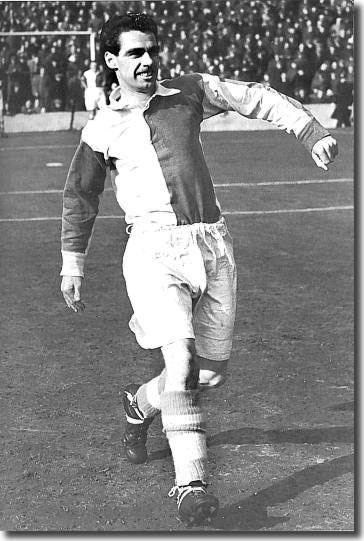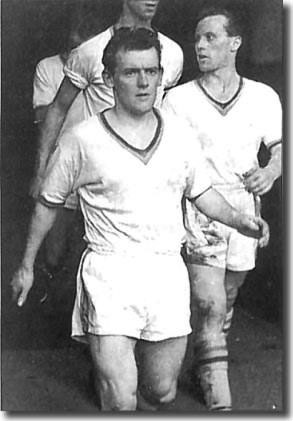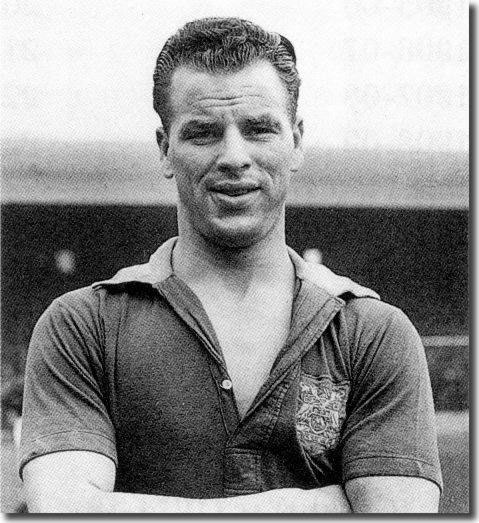 In
May 1952, Major Frank Buckley celebrated
his fourth year as manager of Leeds United. When he joined them in 1948,
they had just finished 18th in the Second Division.
After one season spent scurrying around in the basement
of Division Two, he transformed them into a notable force in the division
on the back of a sound youth and scouting policy, strong team work and
the redoubtable defensive excellence of the young Welsh giant, John
Charles.
In
May 1952, Major Frank Buckley celebrated
his fourth year as manager of Leeds United. When he joined them in 1948,
they had just finished 18th in the Second Division.
After one season spent scurrying around in the basement
of Division Two, he transformed them into a notable force in the division
on the back of a sound youth and scouting policy, strong team work and
the redoubtable defensive excellence of the young Welsh giant, John
Charles.
But try as they might, Leeds United just could not make the real breakthrough.
For three seasons in a row they had finished within five points off promotion
and 1951/52 had seen the strongest challenge
yet, when only a loss of form over the last five weeks had cost them dear.
Buckley was continually peeved by the lack of financial resources available
to him and was approaching the end of his patience.
The Major's shortage of funds could have been solved at a stroke, at
least temporarily, if he had chosen to capitalise on the talent of Charles.
Captain Tommy Burden had been left in no doubt that it was on the Major's
agenda for some time in the future: 'I remember when a lot of clubs were
after him saying to Buckley, "You're not going to sell him, are you?"
He said, "You watch me ... I like money in the bank to cover my salary
... he'll go if I get the right money for him".' But, as yet, Charles
was still happy at Elland Road and the Board knew he was more valuable
to them than money. The Major, however, had built his entire career on
trading players, and it is surprising that he did not choose to realise
the profit he could have made on his greatest asset.
Buckley was now 68 and did not have too many good years left in him.
He was ready for one last big push for the top and made a number of changes
during the summer of 1952.
At the end of the previous season, goalkeeper John Scott and full-back
Grenville Hair had taken over the roles previously held by Harry Searson
and Jimmy Milburn. Before Christmas both Searson and Milburn were to depart
Elland Road, along with forwards George Miller, Billy Hudson, Ron Barritt,
Ernie Stevenson, Peter Harrison and Frank Fidler, plus half-back Don Mills.
Buckley brought in goalkeeper Roy Wood and forwards Ken Hastie, Andy McCall
and Glaswegian George Meek. In October he forked out £10,000 for Blackburn
forward Albert Nightingale and snapped up Bobby Forrest from junior football.
Meek had fewer tricks in his repertoire than the skilful Harold Williams,
but made up for it with his hard working approach. He seemed to have endless
stamina and was a key provider for the forwards, hitting speedy and precise
crosses from either wing. Nightingale was a renowned inside-forward, born
in Rotherham in November 1923. Leeds had tried to sign him twice before,
in March 1948 when he left Sheffield United but chose to join Huddersfield,
and again in October 1951, when Blackburn had paid £12,000 for him. He
played with the fire, commitment and wily gamesmanship that Buckley's
Leeds side could often be accused of lacking. Tommy Burden: 'You were
pleased to have him on your side - he was a bugger when he was tackling.'
John Charles: 'He'd get tackled on the halfway line and fall down in the
area.' Jack Charlton: 'Albert was
notorious in the six-yard area. As the ball was being played into the
box, he would tap his opponent on the ankle, the fellow would howl and
grab his foot - and our Albert would be free to knock the ball into the
net. Nine times out of ten, the referee didn't spot it because he was
following the ball, but the other players knew exactly what had happened,
and I saw them chasing him around the pitch or complaining to the ref.'
Buckley opened his campaign with Scott in goal, Jimmy Dunn and Hair at
full-back and a half-back line of Eric Kerfoot, Charles and skipper Burden.
His forward line read Williams, Ray Iggleden, Mills, Andy McCall and Arthur
Tyrer, but it was a lightweight combination with only Williams and Iggleden
offering any real punch. They went down 1-0 at Huddersfield on the first
day of the season and  never
looked like scoring against a team that had been relegated the previous
year after conceding 82 goals. The Yorkshire derby attracted a crowd of
more than 35,000 to Leeds Road.
never
looked like scoring against a team that had been relegated the previous
year after conceding 82 goals. The Yorkshire derby attracted a crowd of
more than 35,000 to Leeds Road.
back to top
Frank Fidler and Jim Langley, notionally a left-back, came into the side
in the next match for Mills and Tyrer. Langley got a goal, as did Iggleden,
in a 2-2 draw away to Bury who had finished the previous season in 17th
spot. The same eleven were named for the visit of Third Division (South)
champions Plymouth Argyle on 30 August, but had to thank an own goal for
a scrappy 1-1 draw. Leeds had just two points from three matches, all
of which they could have expected to win. They managed to overturn Bury
2-0 when they visited Elland Road on September 3, with Iggleden and Langley
the scorers again, but then lost 3-1 at Rotherham and 1-0 at home to Birmingham.
The Midlanders were a strong team, only missing out on promotion the previous
season on goal average and widely tipped to make it this time. However,
after six games Leeds had just 4 points, relegation form in anybody's
book.
Buckley continued to mix and match his forwards for the next few games.
He thought he had struck gold when 17 year old Barry Smith and South African
Ken Hastie both had scoring debuts in the autumn, but it was clear that
he was not happy with his attack. Shirt numbers 1 to 6 were filled by
the same players for the first 12 matches and the defence had been strong
and quite reliable, but the team did not have enough punch up front. After
12 games, Leeds' points total had struggled to a disappointing 9, with
just two victories, and by 19 October, United were down in 16th place,
just three points clear of the relegation spots.
For Buckley, the die was now cast. He brought Irishman Jim McCabe back
for his first start of the season at centre-half and pushed Charles up
front, alongside debutants Meek and Nightingale and the old firm of Williams
and Iggleden. The first game, away to long time leaders Sheffield United,
who were on their way to the Second Division title, resulted in a 2-1
defeat, with Nightingale getting Leeds' goal. Buckley persevered, however,
and Charles and Nightingale partnered each other in the next 17 games.
Meek missed just two more games all season.
The new forward line seemed to hit it off immediately and after the Sheffield
defeat they went on a quite remarkable run. Nightingale got two goals
and Charles another in a 4-1 hammering of Barnsley and then the Welshman
went into overdrive. He hit Leeds' next 12 goals, in a run of seven unbeaten
matches, which brought him two hat tricks. In fact, from his first match
at No 9 on October 11, Charles scored 27 goals in 29 appearances, a quite
startling return. Buckley had tried Charles up front before, but he had
never previously shown sharpness like this and he was a revelation. He
was an outstanding centre-half, extremely difficult to best either in
the air or on the ground, but seemed to be twice the player in the opponents'
half.
Buckley's only regret was that he did not have two of the Welshman because,
reliable as McCabe was, he was no John Charles and the defence was nowhere
near as tight without him. Beggars cannot be choosers, however, and the
Major stuck boldly by his new line up, even when they went through a tricky
spell in March and April. Leeds had worked their way up through the division
into quite a handy seventh position by the end of January, ready to challenge
for promotion, but succeeded in winning just five of their last 16 games
in the league. As a result they spiralled back down the table, finishing
a hugely disappointing 10th, with a single away win to their credit.
Jack Charlton, a few days short
of his 18th birthday, made his debut in the last game of the season, a
1-1 draw at Elland Road against Doncaster. He had the distinct honour of playing in Major Buckley's last game in charge
at the club, because immediately afterwards he tendered his resignation
after five years at the helm. The continual scrimping and saving and scrabbling
for cash had had their impact on one of the most charismatic names in
English football. He almost immediately took over at Walsall, who had
just finished bottom of the Third Division (South).
the distinct honour of playing in Major Buckley's last game in charge
at the club, because immediately afterwards he tendered his resignation
after five years at the helm. The continual scrimping and saving and scrabbling
for cash had had their impact on one of the most charismatic names in
English football. He almost immediately took over at Walsall, who had
just finished bottom of the Third Division (South).
Charlton recalls the time well: 'My first season as a pro at Leeds was
pretty uneventful. I did my physical work, and played in five a side games
involving some of the senior players, but otherwise never came in contact
with them. They were in one dressing room, the young pros in another -
and the demarcation lines were such that you never crossed over.
'By this stage, I was regarded as a regular on the second team, though
it has to be said that on occasions I played with the thirds. Still, I
was happy enough with my progress as we approached the last weekend of
the season.
'I've said that we never set foot in the senior dressing room. Well,
that's not quite true. You see, the manager never read out his team to
the players. He'd just post them on the back of the door in the senior
dressing room. All three teams played on a Saturday, so when you finished
training on the Friday, you'd peep through the door and see where you
were playing. And on Friday, 24 April 1953, I got the biggest surprise
of my life. No sign of my name on the thirds or on the reserve team -
but bloody hell, there it was, "J Charlton" in the first-team,
to play Doncaster Rovers the following day! And here's all these senior
players looking at me, not saying a word.
'Some of them had possibly never heard my name to that point. And when
I looked again at the sheet on the door, I discovered that John Charles
had been moved up to centre-forward, and I was taking his place at centre-half.
Talk about going in at the deep end!' (Big Jack's memory is not 100% accurate.
Charles had been playing up front for some time, in the No 8 shirt alongside
centre-forward Bobby Forrest, with Jim McCabe at No 5, but both McCabe
and Forrest had been dropped for the game.)
'Incredibly, the manager never came near me that day, never told me why
he had put me in his team, nothing. And when I climbed aboard the first-team
bus taking us to Doncaster the next day, I was left completely alone,
without as much as a word from my new team mates. I mean, nobody told
me what I was expected to do, no tactical talk, nothing. I was left to
my own devices until Eric Kerfoot, perhaps sensing my predicament, came
across and said, "Son, they've picked you because they think you're
good enough. Now, go and prove them right."
'Fortified by those few words, I stripped and made ready for my big test.
Doncaster didn't have a bad team in those days. I discovered that it was
my responsibility to look after Eddie McMorran, a big, bustling Irishman
who normally hit first and asked questions afterwards. To be fair, however,
he didn't abuse the raw kid playing against him and the report in the
paper the next day said that Jack Charlton hadn't let Leeds down in a
1-1 draw. And that was the first occasion that I had the doubtful pleasure
of reading about myself in the papers. I had made it into the first team
but nobody needed to remind me that I still had a lot of learning to do
in the business.'
Other Football Highlights from 1952/53
- When Blackpool reached the Cup final again everybody in the country,
apart from the residents of Bolton, were hoping that they would win.
Stanley Matthews, at 38, was playing at Wembley for the third time and
everybody believed that this was his last chance to collect a winner's
medal. It didn't look likely when Bolton led 3-1 after an hour. But
Matthews then took over and supplied the ammunition from the right wing
to allow Blackpool to turn it around to end up 4-3 winners with Stan
Mortenson hitting a hat trick in what will always be known as the Matthews
Final
- Derek Dooley's uncompromising play at centre-forward had worked wonders
for Sheffield Wednesday as they won promotion but it was less well received
in the First Division. Nevertheless Dooley had still scored 16 goals
in 29 games before his career was ended by a terrible accident. He broke
his right leg in a match at Preston in February when he challenged the
keeper for a 50-50 ball. At first it seemed to be a straightforward
injury but gangrene set in when a cut became infected and Dooley had
to have his leg amputated and his career was over at the age of 23
- Arsenal's final league match on the Friday before the Cup final was
every bit as dramatic as the events that unfolded at Wembley the next
day. For the second year in a row the First Division was a close run
thing which, in the final months, had four contestants - Arsenal, Burnley,
Preston and Wolves. First Burnley, then Wolves faded, reducing the field
to a two horse race. When Preston beat Arsenal the Saturday before and
condemned Derby to relegation on Wednesday they led the table by two
points with all their matches completed. Arsenal had to beat Burnley
in their last match and then goal average would come into play. The
Gunners came back from a goal down to take a 3-1 lead, but let Burnley
in for a late goal which gave them the jitters, but they held on to
take the title on goal average. Skipper Joe Mercer finally announced
his retirement after the triumph, six years after he first decided to
go
back to top












 In
May 1952, Major Frank Buckley celebrated
his fourth year as manager of Leeds United. When he joined them in 1948,
they had just finished 18th in the Second Division.
After one season spent scurrying around in the basement
of Division Two, he transformed them into a notable force in the division
on the back of a sound youth and scouting policy, strong team work and
the redoubtable defensive excellence of the young Welsh giant, John
Charles.
In
May 1952, Major Frank Buckley celebrated
his fourth year as manager of Leeds United. When he joined them in 1948,
they had just finished 18th in the Second Division.
After one season spent scurrying around in the basement
of Division Two, he transformed them into a notable force in the division
on the back of a sound youth and scouting policy, strong team work and
the redoubtable defensive excellence of the young Welsh giant, John
Charles. never
looked like scoring against a team that had been relegated the previous
year after conceding 82 goals. The Yorkshire derby attracted a crowd of
more than 35,000 to Leeds Road.
never
looked like scoring against a team that had been relegated the previous
year after conceding 82 goals. The Yorkshire derby attracted a crowd of
more than 35,000 to Leeds Road. the distinct honour of playing in Major Buckley's last game in charge
at the club, because immediately afterwards he tendered his resignation
after five years at the helm. The continual scrimping and saving and scrabbling
for cash had had their impact on one of the most charismatic names in
English football. He almost immediately took over at Walsall, who had
just finished bottom of the Third Division (South).
the distinct honour of playing in Major Buckley's last game in charge
at the club, because immediately afterwards he tendered his resignation
after five years at the helm. The continual scrimping and saving and scrabbling
for cash had had their impact on one of the most charismatic names in
English football. He almost immediately took over at Walsall, who had
just finished bottom of the Third Division (South).